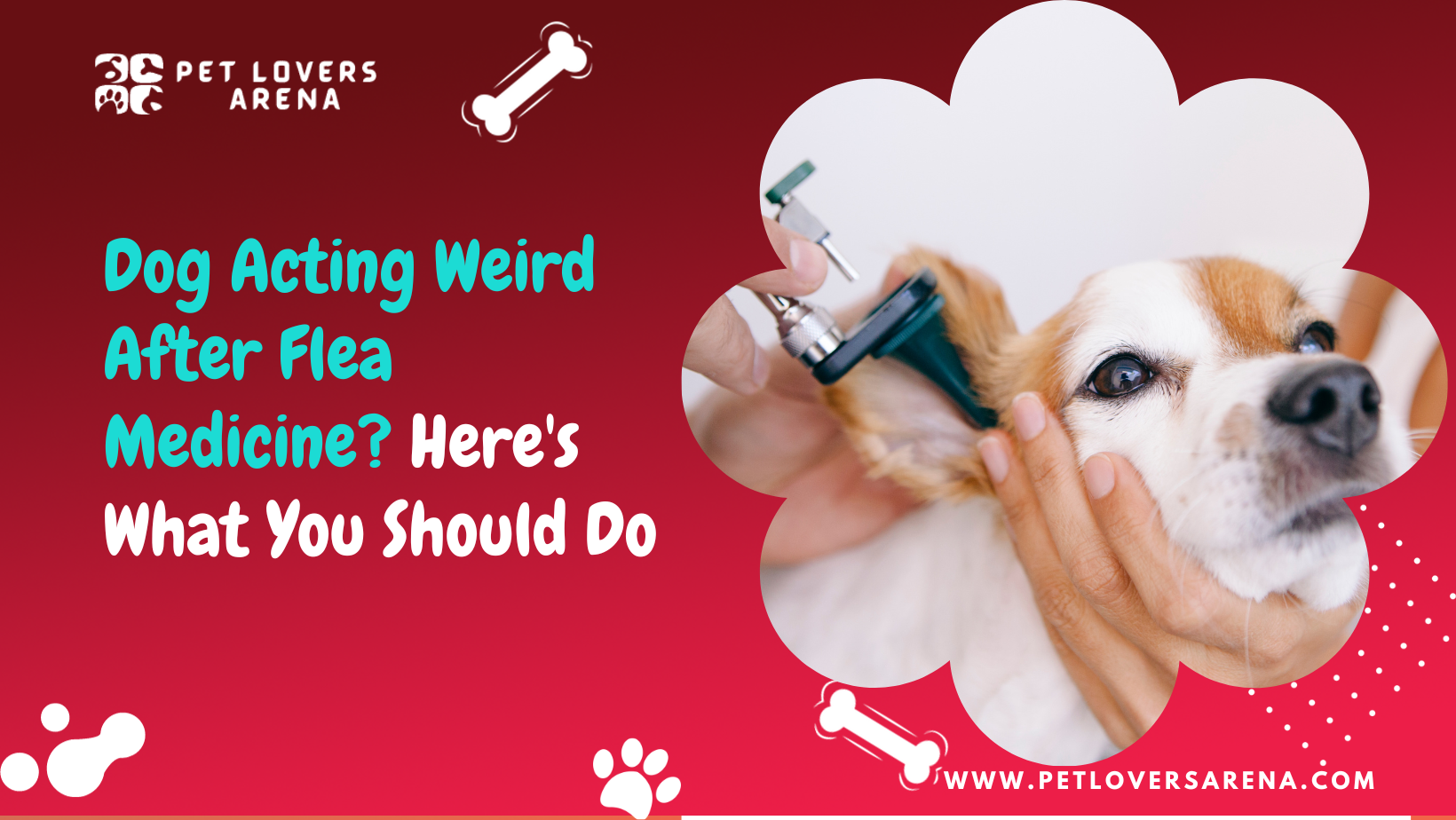Protecting your dog from fleas using efficient flea medication is one of the most effective and important steps toward your dog’s health. Fleas are small parasites that infest your dog’s body and travel in your dog’s whole body. Thus, fleas can be extremely dangerous to your dog’s health.
To protect dogs from infections and health problems caused by fleas, flea medications are available on the market. When applied to the dog’s body, these medications help to keep parasites away. Using a pipette, the best place to apply flea medicine is near your dog’s shoulder, as this is the area where your dog hardly licks.
Some dogs’ bodies show weird reactions to flea infestations on their bodies. This article will help you to understand the possible reasons why your dog shows weird behavior after a flea infestation and advise you on the steps you should take next.
Why is Your Dog Acting Weird After Flea Medicine?

Your dog may freak out after the application of flea medicine. The possible reasons behind this weird behavior of your dog after flea medication can be many.
Dogs that freak out after applying flea medication can hurt themselves somewhere. Not only this, but some owners have observed that their dog has suddenly started getting reactions from their usual flea medications, which leads to weird behavior in dogs. If you have a lazy dog, the application of flea medications can make the situation worse.
The reason for the weird behavior of your dog after flea medication application can be physical or psychological. The best rational decision is to consult your dog’s veterinarian whenever you notice your dog behaving weirdly after applying or consuming flea medication.
Here are some possible reasons that may cause your dog to behave weirdly after applying flea medication.
1. Allergies
Your dog may be allergic to anything. You will not know about your dog’s allergy unless and until your dog comes across any allergens that show weird effects or reactions on your dog’s body. Your dog can be allergic to any allergen, and it can be present in your dog’s food, medications, environment, etc. Dogs can be allergic to even the anti-allergy medications you give them. So don’t forget to consult a veterinarian before giving any medications to your dog, even anti-allergic medications.
Flea medications may contain an allergen that triggers an allergic reaction, resulting in your dog’s weird behavior.
2. The wrong flea treatment
Dog owners should always be careful while providing flea medications to their dogs. One of the most common reasons a dog starts behaving weirdly after flea medications is the unjust treatment provided to stop flea infestation in dogs.
Every dog has flea treatment requirements according to the dog’s body and the breed to which your dog belongs. Say, if you give your large dog the flea medication you used for your small dog, it will cause problems and vice versa. Remember that the dog’s veterinarian should prescribe the flea medications you give to your dog.
The flea medications you give to your dog should be after completely calculating your dog’s age, height, weight, size, and other factors. If you give your dog the wrong flea treatment, it can cause many problems, including the dog’s weird behavior. Thus, always be careful and don’t forget to consult your dog’s vet.
3. Wounds
If your dog has any wounds on its body, be careful while providing flea medications, especially while applying flea medications. Sometimes, due to wounds on your dog’s body, the toxic medications can enter the dog’s skin and then spread throughout the dog’s body.
If the wound in your dog’s body is deep, there are high chances that the flea medication will travel deep into your dog’s bloodstream and cause toxicity. Thus, consulting a veterinarian about the issue of wounds before the application of flea medications is extremely necessary.
4. Ingestion
Put the flea medication on your dog’s body so that your dog cannot lick it. If you put it on your dog’s body in such an area that your dog can easily lick it, it will cause trouble. The dog can easily ingest this medication after licking the area where you spray the medication, so the trouble that follows afterward will be harmful.
Dogs are often interested in chewing on different things. If you have put flea medication near the dog’s collar, your dog may lick it. Ingestion of flea medications is toxic, leading to some serious health issues in your dog afterward. Your dog is acting weirdly suddenly after a flea medication application has this ingestion as one of the main reasons.
Are Flea Medications Toxic for Your Dog?
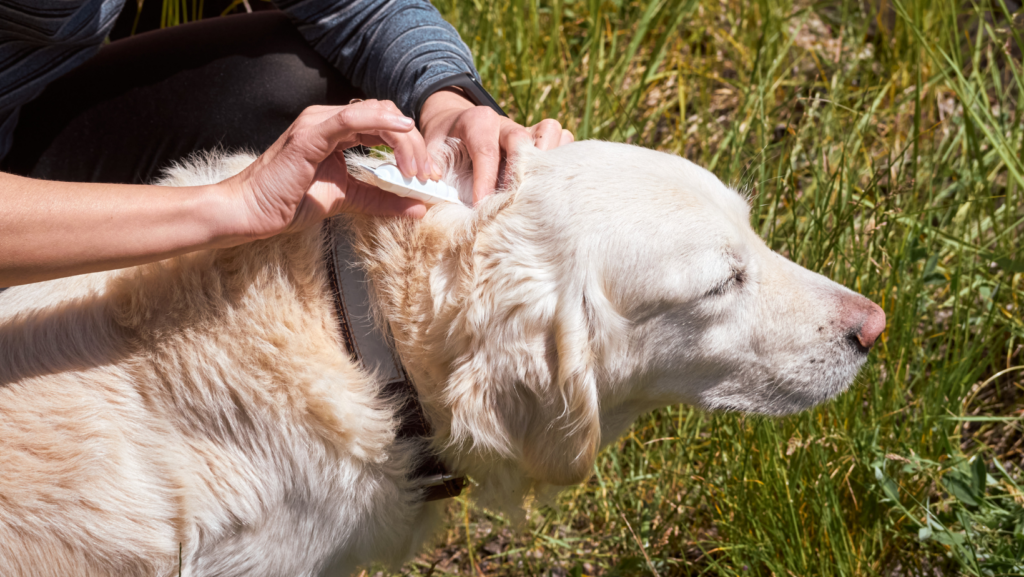
The design of flea medications is so that it prevents any flea from attacking your dog and kills any fleas that have manifested themselves in your dog’s body.
The ingredients also vary depending on the brand you use for your dog’s flea medication. The constant ingredient you will find in all the medications you use for killing fleas is ectoparasiticides. Ectoparasiticides are the ingredients used for killing the external parasites in your dog’s body. For internal parasites, treatment and ingredients vary. A flea is a parasite living on a dog’s body. Therefore, flea medications include ectoparasites in them.
You can use many products to prevent fleas from manifesting on your dog’s body. However, depending on the product you use for this purpose, the type of ectoparasiticides you will find in your products will vary. For example, pipettes of flea medication (liquid flea medication) are much more effective than shampoos, dog collars, and other hygiene products that your dog uses regularly.
The parasite killers or flea medications you use are harmful to the insects but not to the canines. In addition, the medications have less effect on dogs because dogs recognize the toxic effect of flea medications on their bodies more easily and quickly than insects or fleas.
There are various ectoparasites you can use on your dog’s body to prevent fleas. These ectoparasites are of different kinds depending upon their different brands. For example, here is a list of different ectoparasiticides in different flea medications or dog hygiene products like shampoos.
- Fipronil: Fibronil finds its use in most dog products. The frontline consists of Fipronil. In the case of topical use, it is not very toxic. If the dog smells Fipronil, the toxicity increases.
- Organophosphates: Organophosphates are highly toxic. Organophosphates make their use in flea collars but not in pipettes.
- Pyrethrins: Pyrethrins make their use in organic compounds. Pyrethrins can be obtained from a plant, namely the chrysanthemum. Various insecticides include pyrethrins. They are mainly used to kill insects like mosquitoes and fleas on animals such as dogs.
- Indoxacarb: Indoxacarb is the main pesticide used for killing fleas in animals, mainly dogs and cats. Indoxacarb is not very toxic for dogs but highly toxic for cats.
- Pyrethroids: Pyrethroids are similar to pyrethrins. Pyrethrins can be obtained from chrysanthemum plants, and so do pyrethroids. Pyrethroids kill fleas, mainly in dogs and cats, but it is highly toxic for cats. As a result, avoid pyrethroid-containing cat products.
Whether an ectoparasiticide is dangerous for your dog or not depends upon the quantity your dog has ingested inside their body.
No doubt the medicines are there to kill fleas in your dog’s body, but they are toxic. If your dog ingests the pesticides, there are high chances of getting extremely ill or behaving weirdly. In addition, some pesticides may not suit your dog’s body type, causing them to behave weirdly.
If you notice a weird behavior in your dog after applying flea medications, it can be due to reactions to flea medications. The other thing is that if your dog ingests these medications, they are likely to behave weirdly. The best thing for a dog’s owner is to take the dog to the veterinarian immediately. You should also keep pesticides away from your dog so they can’t ingest them.
Side Effects of Flea Medication in Dogs
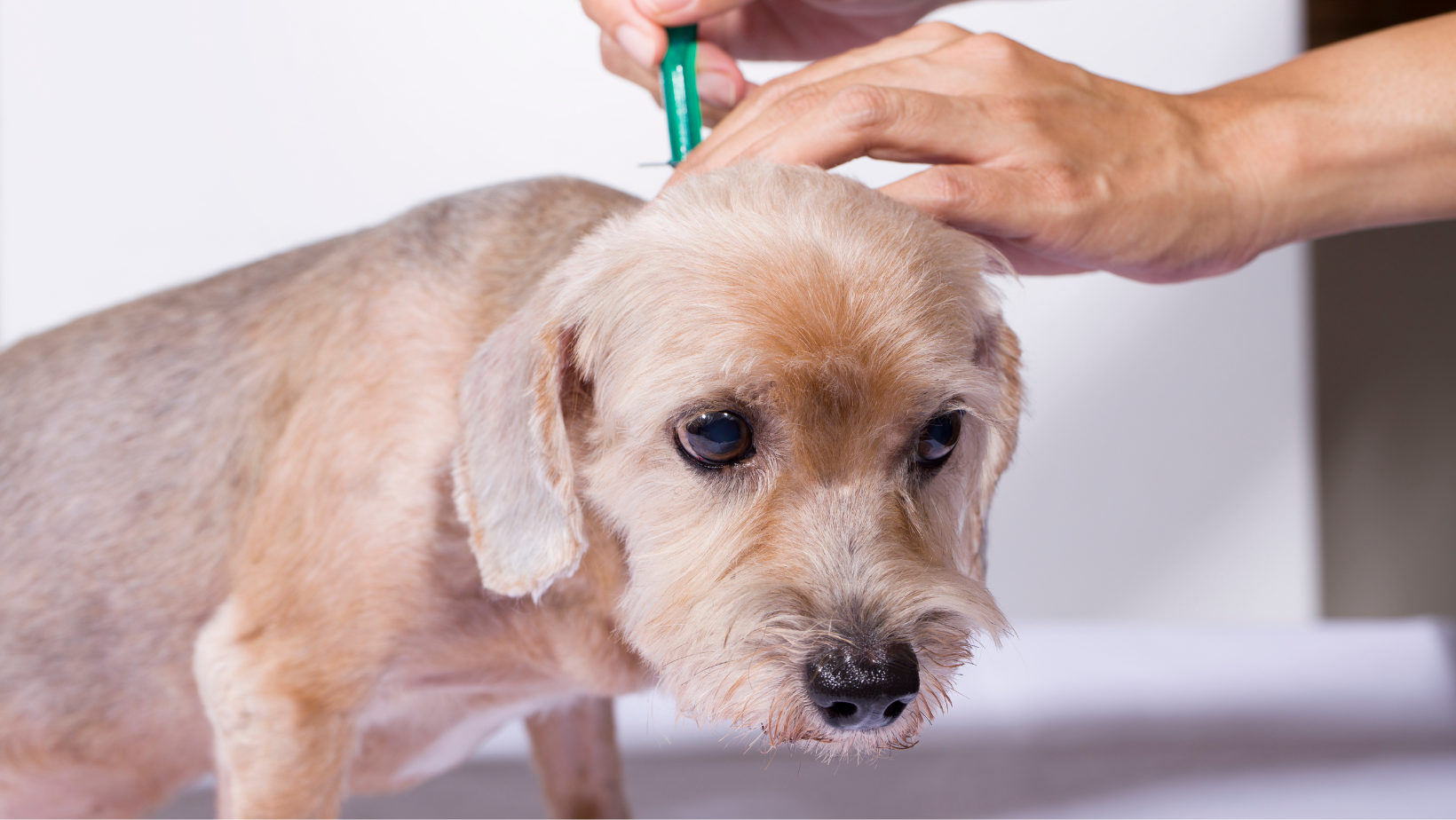
After applying flea medications, you will notice your dog feeling irritated or scratching its body. Scratching by a dog is completely normal. The reason is that the fleas in your dog’s body may get super active before dying, irritating the dog’s body. Thus your dog scratches its body often.
Your dog may start roaming around the home. The dog may freak out and start getting confused. After flea medications, the dog may start feeling restless. Check for these signs.
If your dog starts scratching its body, make sure they don’t scratch it excessively. Excessive scratching of dogs’ bodies can be a sign of restlessness in dogs and dangerous. Also, don’t forget to note the difference between dogs’ mild scratching and excessive scratching.
Your dog will show symptoms or side effects if it has ingested the medicine. Poisoning can occur as a result of your dog ingesting flea-killing medicine. There are many different symptoms your dog will show due to poisoning. You need to have a look at all the symptoms your dog shows carefully.
If your dog has ingested flea-killing medications, there can be gastrointestinal problems for your dog commonly. In addition, the dog may die in severe cases due to poisoning due to flea medications. As an advice, it is best to take your dog to the vet as soon as you notice the symptoms.
Aside from strange behavior, you’ll notice a few other things in your dogs. These symptoms and side effects include:
- Fever and fatigue in dogs excessive lathering behavior.
- Tingling sensation and excess salivation.
- Vomiting and diarrhea may occur if the dog ingests the medicine.
- Hypothermia, cramps, itching, and asthma are common.
- Dogs may experience tremors throughout their bodies.
- Nervousness or confusion.
- Abnormal pupil dilation, red skin, or red patches on the dog’s skin.
- Limbs get numb.
- Loss of control of the bladder and excessive urination.
- Seizures and breathing problems in dogs
These medications start showing the side effects after a few hours of the implication of the medicine on the dog’s body. Try to be near your dog for a few hours after applying any medications to your dog’s body. The medication may show its effect on your dog within a few hours. In addition, you must monitor and look for any side effects in your dog from these medications in case an adverse reaction occurs.
Serious and adverse reactions will occur if there is a wrong dosage or an overdose of any medication in your dog’s body. The other reason for the adverse effect can be the ingestion of flea medications by the dog. Rest assured, you need to be careful while providing flea medications to your dog. Don’t apply the medications to the area where your dog is likely to lick.
List of Symptoms to Notice in Dogs for Intoxication By Flea Medications

Flea medications are mainly for killing fleas on your dog’s body. But these medications can have harmful side effects on the dog’s body. The symptoms of flea medication in dogs vary from mild to extremely bad. Here are the symptoms you will notice in your dog as side effects after flea medication.
- Allergic reaction: Under this category, itching, swelling, coughing, congestion of the chest, short breath, shock, and rarely you can notice death in dogs.
- Mild symptoms: After flea medications, you may notice drooling, diarrhea, mild depression, vomiting, and other symptoms.
- Severe reactions: Severe allergic reactions after application of flea medications. Some of the negative effects on your dog include depression, frequent vomiting and diarrhea, nose bleeding, loss of body coordination, and seizures.
Your dog’s veterinarian will make a proper diagnosis of your dog, and then any treatment will be provided to the dog. However, it would be best to keep a close eye on your dog’s behavior and not only when the harmful effects or symptoms start showing in the dog. You should also keep a record of your dog’s medical history as it is important during diagonosis. For example, notice and keep in mind the medications you provide to your dog earlier and inform the dog’s veterinarian about the same before your dog’s treatment begins.
How do You Treat Your Dog for the Toxic Effects of Flea Medications?
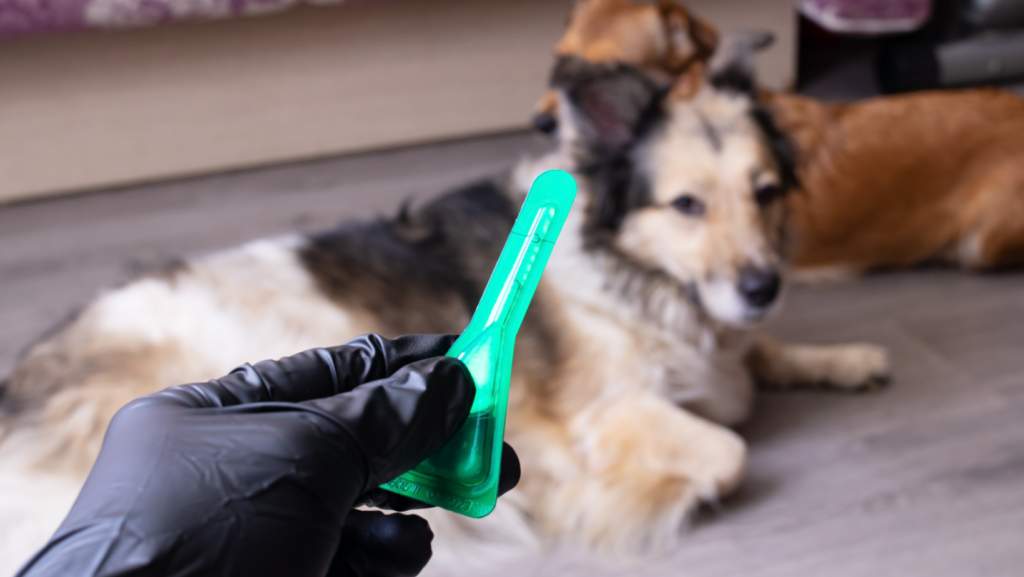
When you treat flea toxicity in your dog, there are some steps and important notes you should keep in mind. First, if you ever suspect that the reactions or severe symptoms in your dog’s body are due to flea medications, take your dog to the veterinarian immediately.
Your dog’s veterinarian will diagnose the dog’s condition and then provide medication to treat the toxicity. If your dog is showing some weird symptoms or allergic reactions in the early morning hours, contact the dog’s vet to inform them about your dog’s condition. It is not easy to diagnose your dog on the phone, but they can provide you with some basic treatment options to help the dog for the time being.
If you cannot go outside to treat your dog who has shown signs of flea medication side effects by chance, you can treat them at home. Here are some measures you can follow to treat your dog at home. These measures will help you treat your dog at home until your dog’s vet arrives or if the symptoms or signs are not severe.
Don’t panic: It’s normal to see your dog’s allergic reactions or other side effects after flea medication. It happens with numerous dogs. You don’t need to panic and try to stay calm. Panicking will only worsen the situation. If you lose your calm, you won’t be able to think clearly. Noticing your panic state will increase your dog’s nervousness, so be calm and composed.
Don’t use oil or milk: Some dog owners believe that giving oil or milk to the dog will lessen the reactions. Unfortunately, the assumption is not true, and it can have counter-reactions also. Giving oil or milk will lead to more absorption of the toxins in your dog’s body, worsening your dog’s condition.
Skin allergic reaction: If the reaction you notice is due to a skin infection, immediately clean the area where you have applied the flea medication. Clean the area of the skin where you apply for the medicine properly. But cleaning or washing the area with shampoo is not advisable as it may worsen your dog’s condition.
Dog Vomiting: You should not make your dog vomit unless and until your dog’s veterinarian advises you to do so. If your dog’s veterinarian advises you to make your dog vomit, they will advise you to give your dog hydrogen peroxide and water solution. But giving your dog this solution without the advice of a veterinarian is not preferable.
Provide information to the dog’s veterinarian: When you visit your dog’s veterinarian, you should inform him about the problem your dog suffered from recently. Also, inform him about your dog’s medical history and any reactions to the dog’s body. The information you provide will help the veterinarian prepare a proper diagnosis. Also, give information about the flea medications your dog takes.
Don’t give another dose of medicine: It is common to see reactions in your dog’s body after flea medication, but you should not give your dog anti-inflammatory medication without proper consultation from your dog’s veterinarian. Too much medication can have adverse effects on your dog.
Don’t ignore simple signs and symptoms: If your dog is wandering here and there and is looking confused, you should not ignore these signs in your dog. As mentioned earlier, scratching of the body, breathing problems, and other symptoms are also side effects of flea medications, and it is not advisable to ignore them. Instead, take quick action by consulting the vet about your dog’s health.
Don’t throw away medicine packages: The flea medication you gave your dog should not be thrown out. Instead, it would be best if you showed your dog’s vet the medicine package so that he can prepare the diagnosis. In addition, the medication package allows you to check the component of the medication and the side effects of the medication on your dog.
If you act immediately when you see the reactions in your dog’s body, you can help your dog. Death cases due to flea medication are rare, but poisoning due to flea medication is common. Take advice from the veterinarian and help your dog with proper treatment.
Different Types of Flea Medications and Treatments for Dogs
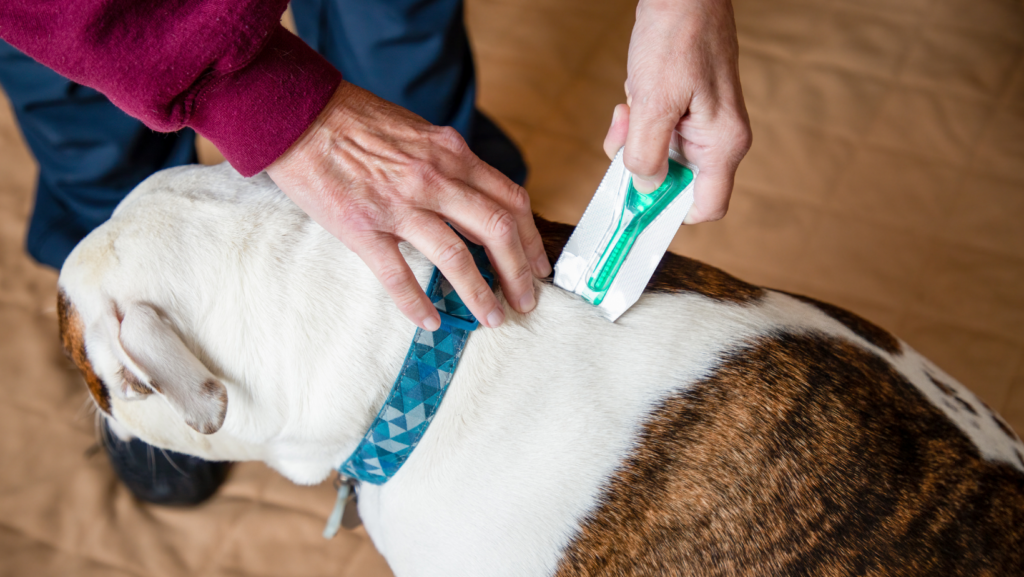
Flea and tick medications keep your dog and home safe from flea infestations. Fleas can cause harm to your dog and home. Thus, flea medication is important. Here is a list of several types of medications dog owners use worldwide.
Oral medications: Among all the medications, dog owners mostly prefer giving their dogs oral medications. After meals, you can give oral medications to your dog. These oral medications kill parasites in your dog’s body. However, as a side effect of these medications, dogs may start feeling lethargic.
Collars: In collars, flea medications are highly concentrated and can easily spread throughout your dog’s body. The only drawback is its strong smell, which irritates dogs.
Powders: Using powders is a time-consuming process as you have to rub the powder throughout the dog’s body. It would be best to avoid the nose, eyes, and mouth areas. The side effects of using powders include diarrhea, vomiting, lack of appetite, etc.
Sprays: Sprays are the cheapest product to protect your dog from flea infestations. Sprays stay on your dog’s body for several days or months only if you don’t wash off the product completely. Rest assured, you have to be careful not to apply the spray on your dog’s nose and mouth area.
Topical Medications: Topical medications are there so that you can apply them to your dog’s body to prevent flea infestation. These medications are effective. Depending upon your dog’s size, you have to decide the quantity of medicine to be applied. Topical medications reach the sweat glands of the dog’s body. This medication remains in your dog’s body even after bathing for several weeks.
Dips: Dips for dogs’ flea infestation are a mixture containing pyrethrin and water applied to a dog’s body using a sponge. It would be best not to wash it off but let it dry on your dog’s body. Dips are not preferable for puppies and pregnant dogs because of their harmful effects.
Shampoos: Shampoos provide short-term protection to dogs against fleas but do not have long-term effects. Once you apply shampoo to your dog’s body, let it rest for a few minutes, say 10 to 15 minutes, and then wash it off. Be careful that the shampoo doesn’t enter the dog’s eyes or mouth, causing problems.
Final Words
Fleas and other parasites are harmful to your dog. Thus, dog owners make efforts to protect their dogs from flea manifestations. In addition, your dog’s medications for flea manifestation have bad effects on your dog’s body. Therefore, if you give the wrong dosage or overdose of flea medication to your dog, it can cause trouble for your dog’s health.
If you notice any abnormal behavior in your dog, contact your dog’s veterinarian. You can provide treatments for your dog who is showing reactions to flea medications, but don’t forget to take the dog to the veterinarian as soon as possible. And never throw away the flea medication packet you provide for your dog. It helps your dog’s vet properly. Diagnose your dog.
Meet Madison Phillips, your compassionate guide to pet well-being. With experience from VCA Animal Hospitals and Laxton Vet Clinics Bellaire Inc. Madison honed her skills and embraced the balance of medical expertise and compassion, through her articles, she simplifies pet care, whether you’re a newbie or an experienced pet parent.

